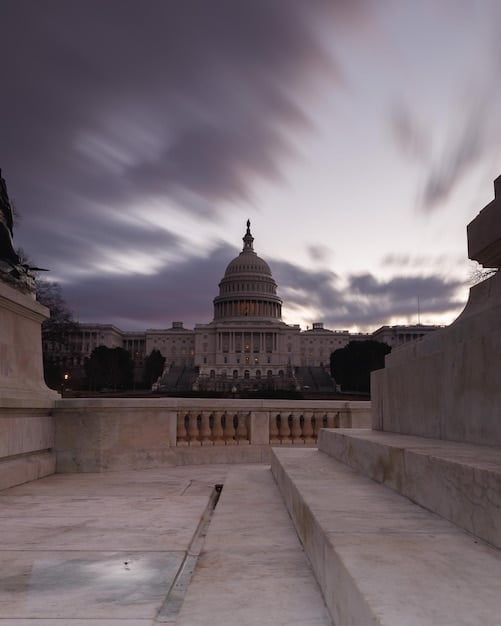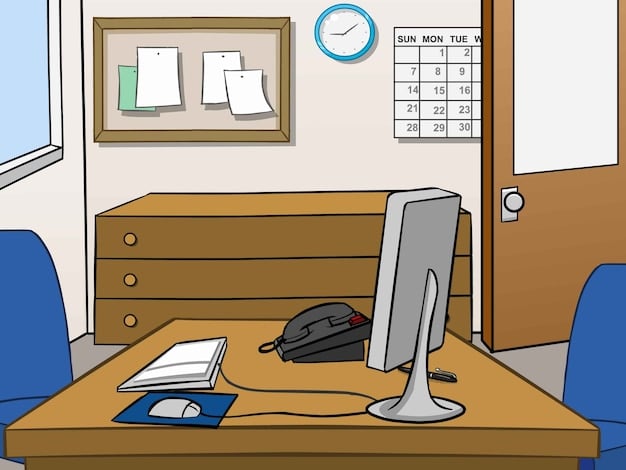Government Shutdown Alert: Impact on US Services and Benefits

A looming government shutdown threatens to disrupt essential federal services and benefits, impacting millions of Americans and raising concerns about economic stability.
With a looming deadline, the specter of a government shutdown hangs heavy, threatening to disrupt essential services and benefits for millions of Americans. Understanding the potential ramifications is crucial as political tensions escalate in Washington. Here’s what you need to know about the possible government shutdown looms – impact on federal services and benefits.
Understanding Government Shutdowns: A Brief Overview
A government shutdown occurs when Congress fails to pass funding bills or the President doesn’t sign them into law. This results in a temporary closure of non-essential federal government operations.
Essentially, it’s a budgetary impasse that can have far-reaching consequences.
What Triggers a Shutdown?
The primary trigger is the inability of Congress to agree on and pass appropriations bills that fund the government. Disagreements over spending levels, policy riders, and political priorities often lead to gridlock.
Essential vs. Non-Essential Services
Federal services are categorized as either essential or non-essential. Essential services, such as national security, law enforcement, and air traffic control, continue to operate during a shutdown. Non-essential services, like national parks, passport processing, and some federal agencies, are typically suspended.

- Essential Services Continue: Critical functions that protect life and property.
- Non-Essential Services Suspended: Affecting public access and administrative tasks.
- Impact on Federal Employees: Many face furloughs, impacting their livelihoods.
During a government shutdown, understanding which services are affected is crucial. Essential services will continue to operate, while non-essential services may be temporarily suspended. The impact on federal employees can be significant, with many facing furloughs and uncertainty regarding their employment status.
Impact on Federal Employees and Contractors
A government shutdown directly affects federal employees and contractors, leading to furloughs and financial insecurity. The repercussions extend beyond immediate salary concerns.
Many federal workers face unpaid leave, impacting their families and the economy.
Furloughs and Unpaid Leave
Federal employees deemed non-essential are placed on furlough, meaning they are temporarily out of work without pay. This can create significant financial hardship, especially for those living paycheck to paycheck.
Delayed or Suspended Contracts
Government contractors also face uncertainty during shutdowns. Contracts may be delayed or suspended, leading to lost revenue and potential layoffs.

- Financial Strain on Employees: Missed paychecks and mounting bills.
- Contractor Uncertainty: Project delays and potential job losses.
- Economic Ripple Effects: Decreased spending and potential recessionary pressures.
The ripple effects of a government shutdown can extend beyond federal employees and contractors. Reduced consumer spending and economic uncertainty can negatively impact the broader economy. Understanding these implications is crucial for assessing the true cost of a government shutdown.
Social Security and Medicare: What to Expect
Social Security and Medicare are considered essential services, but a government shutdown can still cause disruptions. Beneficiaries need to be aware of potential delays and changes.
While checks are likely to continue, other services might face slowdowns.
Continued Benefit Payments
Social Security and Medicare benefit payments are generally expected to continue during a shutdown. These programs are funded through dedicated taxes and are considered mandatory spending.
Potential Service Delays
Despite the continuation of benefit payments, other services provided by the Social Security Administration and Medicare may experience delays. This could include processing new applications, resolving disputes, and providing customer service.
Even though payments will continue, it’s essential to check for updates during a shutdown. Any disruption, even minor, to vital systems can affect the ones that depend on it. Being informed will help you manage the situation.
National Parks and Tourism
Government shutdowns often lead to the closure of national parks and other tourist destinations, impacting the tourism industry and local economies. This can result in significant economic losses and inconvenience for travelers.
Parks’ closure can devastate tourism and local businesses depend on it.
Park Closures and Reduced Services
National parks are typically closed during a government shutdown, as they are considered non-essential services. This means that visitors are unable to access parks, campgrounds, and visitor centers.
Economic Impact on Local Communities
The closure of national parks can have a significant economic impact on local communities that rely on tourism revenue. Hotels, restaurants, and other businesses may experience a sharp decline in sales.
Be sure to check official announcements before planning a trip in case of a shutdown. Stay updated on parks’ status and be ready to adjust plans, especially if you depend on related services.
Impact on Federal Courts and Legal Proceedings
A government shutdown can disrupt the operations of federal courts and legal proceedings, potentially causing delays and inconvenience for litigants. The impact varies depending on the length and severity of the shutdown.
Courts’ operation may be affected, causing uncertainty for those involved in legal cases.
Civil Cases and Litigation
Civil cases may be delayed or postponed during a shutdown, as courts may operate with reduced staff. This can affect individuals, businesses, and organizations involved in legal disputes.
Criminal Proceedings and Law Enforcement
Criminal proceedings are generally considered essential and are likely to continue during a shutdown. However, some law enforcement agencies may experience reduced resources, potentially impacting investigations and prosecutions.
- Delays in Civil Cases: Prolonged legal processes and increased costs.
- Potential Impact on Law Enforcement: Reduced resources and investigative capabilities.
- Uncertainty for Litigants: Anxiety and inconvenience for those involved in legal proceedings.
If you are party to a legal case, maintain ongoing communication with legal representatives. Be ready to adjust timelines and schedules in response to potential changes. Understanding the possible disruptions will help you navigate the situation effectively.
How to Prepare for a Potential Government Shutdown
Preparing for a potential government shutdown involves taking steps to mitigate the potential impact on your personal and financial situation. While you cannot control the political situation, you can take proactive measures to protect yourself and your family.
Preparing in advance can lighten the impact. Follow these steps for a smoother experience.
Review Your Finances
Assess your current financial situation and identify areas where you can reduce spending. Create a budget and prioritize essential expenses.
Build an Emergency Fund
If possible, build an emergency fund to cover essential expenses in case of income disruption. Aim to save at least three to six months’ worth of living expenses.
Stay Informed
Stay informed about the status of government funding negotiations and potential shutdown dates. Follow reputable news sources and government websites for updates.
| Key Point | Brief Description |
|---|---|
| ⚠️ Shutdown Trigger | Failure to pass funding bills in Congress. |
| 👨💼 Employee Impact | Furloughs and potential delays in contracts. |
| 🏞️ National Parks | Possible closures affecting tourism and local economies. |
| 🏛️ Courts | Delays in civil cases and potential impacts on law. |
Frequently Asked Questions (FAQ)
▼
Yes, Social Security benefit payments are generally expected to continue without interruption during a government shutdown, as they are funded through mandatory spending.
▼
National parks typically close during a government shutdown due to the suspension of non-essential services, impacting tourism and recreational activities.
▼
Non-essential federal employees are usually placed on furlough, meaning they are temporarily out of work without pay until the government reopens.
▼
Federal courts may experience delays, particularly in civil cases, due to reduced staff and resources during a government shutdown.
▼
To prepare, review your finances, build an emergency fund, and stay informed about the status of government funding negotiations and potential shutdown dates.
Conclusion
As the deadline approaches, understanding the potential impact of the government shutdown looms – impact on federal services and benefits is crucial. From federal employees facing furloughs to disruptions in essential services and economic uncertainty, the consequences can be far-reaching. By staying informed, preparing financially, and advocating for responsible governance, individuals and communities can better navigate the challenges of a government shutdown.





